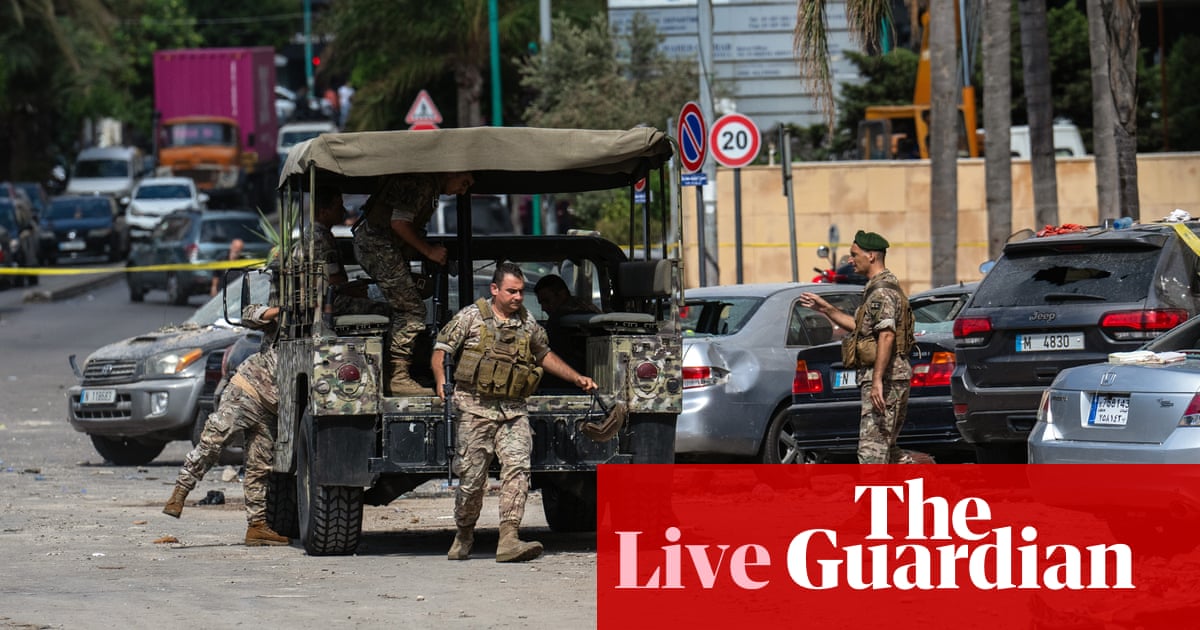Israel launches ground incursion into Lebanon

Peter Beaumont
First details are now beginning to emerge over the scope of Israel’s ground incursion into southern Lebanon. So far the focus of the Israeli operation appears to a series of villages in the area of the border north of the Israeli border communities of Metula, Kfar Giladi and Misgav Am.
The border at this point, north of the town of Kiryat Shimona, pokes up into Lebanon like a finger, exposed on three sides and overlooked at points by high wooded ridges. Beyond is a small plain leading towards the town of Marjayoun (once the headquarters of the Israeli allied South Lebanon Army).
According to Lebanese correspondents in the area the villages on the northern side of the border were targeted heavily during the night by Israeli artillery fire and machine gun fire from the area of Metula.
More, albeit vague details, were provided by the Jerusalem Post which said that the IDF had “manoeuvreed into several villages in the eastern sector of Lebanon on Tuesday, where, according to intelligence, Hezbollah has terrorist infrastructure.
IDF artillery also fired at the area, aiming to destroy terrorist infrastructure, kill Hezbollah terrorists, and disrupt terrorist activity.”
The objectives of the “limited operation” as described by Israel remained largely unclear. In previous wars and operations – including Operation Litani in 1978, the Israeli invasion and occupation of Lebanon in the 1980s through to 2000, and the Second Lebanese war in 2006, Israel has struggled to secure any lasting gains from its military operations.
Airstrikes also continued over night in other parts of Lebanon, including heavy explosions that occurred in the south Beirut suburbs and a strike targeting the Ain el-Hilweh refugee camp in Sidon where at least six people were reported killed including three children in a strike on a member of the Palestinian Fatah movement.
Key events
Israel’s military has published more detail of rocket fire aimed into Israeli territory, saying that in the last hour or so Metula has been targeted twice, and several projectiles were also fired at Avivim. Both Israeli communities are very close to the UN-drawn blue line that separates Israel and Lebanon.
The IDF, in its message on Telegram, said that “some of the projectiles were intercepted and fallen projectiles were identified” and that some fell into open areas. There were no immediate reports of any casualties.

Nimo Omer
In today’s First Edition newsletter, my colleague Nimo Omer spoke to the Guardian’s international security correspondent, Jason Burke, about the latest developments in the region:
More than 1,000 people in Lebanon have been killed in the past two weeks, 6,000 wounded and, according to the Lebanese government, one million displaced. Meanwhile in Gaza, the humanitarian situation has eroded further. With little to no infrastructure available to support the displaced population, disease is rampant and civilians are living in the most catastrophic conditions. There is little political incentive for Benjamin Netanyahu to let up, as the assassination of the Hezbollah leader Hassan Nasrallah has given the embattled Israeli prime minister a political boost. Israel has shown no intention of relenting.
At this point, there is too much uncertainty to predict the long term impact of the assassination of Nasrallah on Hezbollah but in the short term “it’s a really devastating blow”, Jason says. “Not only have they lost a charismatic and popular leader – among his supporters at least – [but] Nasrallah was also competent and effective. You don’t get to stay at the top of a group like that for 32 years without being good at what you do.”
As expected, the Shia militia group has sworn to enact revenge attacks but, as of yet, it appears to have been unable to retaliate in any serious way. “Even though Israeli air defences are very effective, it’s been said for a long time that Hezbollah, which has massive stocks of rockets and missiles, would be able to overwhelm those defences and cause significant casualties and destruction in much of northern and central Israel but so far, they’ve not been able to do anything much,” Jason says.
This hesitation perhaps is borne of an awareness that Israel’s response to such an attack is likely to be equally if not more devastating. “Hezbollah is a state within a state and primarily acts in its own interests, or those of its sponsor, Iran. But whatever happens the consequences for Lebanon are going to be very tough indeed.
You can read more of Jason Burke’s analysis in the First Edition newsletter: Tuesday briefing – What we know so far about Israel’s overnight ‘ground operation’ in Lebanon
A suspected attack by Yemen’s Houthi rebels targeted a ship in the Red Sea, likely marking their first assault on commercial shipping in weeks, the Associated Press reported.
The attack Tuesday morning took place off the port city of Hodeida in the Red Sea, which has become a battlefield for shippers since the Houthis began their campaign targeting ships travelling through the waterway.
A captain on a ship saw four “splashes” near his vessel, the British military’s United Kingdom Maritime Trade Operations centre said in a warning. That likely would have been missiles or drones launched at the vessel.
“All crew are safe and the vessel is proceeding to (its) next port of call,” the UKMTO said.
The Houthis did not immediately claim the attack. However, they sometimes take hours or days to acknowledge one of their assaults.
The Houthis had threatened “escalating military operations” targeting Israel on Monday.
Hezbollah has said it targeted Israeli troops in a town in the country’s north early on Tuesday.
According to a statement from the militant group published in some Arabic media, Hezbollah targeted “Israeli soldiers at the Metula site with artillery shells and achieved casualties.”
The Israeli military has made no comment on reported casualties, but said that after an air raid alert in Metula, five rocket launches were detected.
“Some of them were intercepted”, the IDF said, adding that crashes were detected in the area.
Israel launches ground incursion into Lebanon

Peter Beaumont
First details are now beginning to emerge over the scope of Israel’s ground incursion into southern Lebanon. So far the focus of the Israeli operation appears to a series of villages in the area of the border north of the Israeli border communities of Metula, Kfar Giladi and Misgav Am.
The border at this point, north of the town of Kiryat Shimona, pokes up into Lebanon like a finger, exposed on three sides and overlooked at points by high wooded ridges. Beyond is a small plain leading towards the town of Marjayoun (once the headquarters of the Israeli allied South Lebanon Army).
According to Lebanese correspondents in the area the villages on the northern side of the border were targeted heavily during the night by Israeli artillery fire and machine gun fire from the area of Metula.
More, albeit vague details, were provided by the Jerusalem Post which said that the IDF had “manoeuvreed into several villages in the eastern sector of Lebanon on Tuesday, where, according to intelligence, Hezbollah has terrorist infrastructure.
IDF artillery also fired at the area, aiming to destroy terrorist infrastructure, kill Hezbollah terrorists, and disrupt terrorist activity.”
The objectives of the “limited operation” as described by Israel remained largely unclear. In previous wars and operations – including Operation Litani in 1978, the Israeli invasion and occupation of Lebanon in the 1980s through to 2000, and the Second Lebanese war in 2006, Israel has struggled to secure any lasting gains from its military operations.
Airstrikes also continued over night in other parts of Lebanon, including heavy explosions that occurred in the south Beirut suburbs and a strike targeting the Ain el-Hilweh refugee camp in Sidon where at least six people were reported killed including three children in a strike on a member of the Palestinian Fatah movement.
Opening summary
Hello and welcome to the Guardian’s live coverage of the conflict in the Middle East.
The Israel Defense Forces (IDF) confirmed in the early hours of Tuesday that it had launched what it called a “limited” ground operation in southern Lebanon targeting Hezbollah, while it continued to bombard the rest of the country and also reportedly carried out deadly strikes on Syria.
There were reports of casualties from an Israeli strike on the Ain al-Hilweh Palestinian refugee camp near the Lebanese city of Sidon, while towns near the border with Israel, including Aita al-Shaab, Marjayoun, Wazzani and Khiam were shelled on Monday night. The IDF has not commented on the claims.
US defence secretary Lloyd Austin said he had spoken to his Israeli counterpart Yoav Gallant and that the pair had “agreed on the necessity of dismantling attack infrastructure along the border” with Lebanon.
He also said he had “made clear that the United States is well-postured to defend US personnel, partners, and allies in the face of threats from Iran and Iran-backed terrorist organizations”.
Israel carried out more airstrikes in Dahieh in Beirut’s southern suburbs. The neighbourhood is where Israel levelled several apartment blocks on Friday when it is believed to have used a so-called bunker buster bomb to kill Hezbollah leader Hassan Nasrallah.
Syrian state media reported that three civilians were killed in Israeli airstrikes, while state television reported that one of its anchors was killed; it was not clear if they were among the three civilians.
In other developments:
-
Heavy shelling into Lebanon was taking place along the border in the area north of Kiryat Shimona. The towns of Marjayoun, Wazzani and Khiam were being shelled on Monday night. There were also reports of a heavy presence of Israeli aircraft over southern Lebanon.
-
Israel launched a strike on a building in the Ain al-Hilweh Palestinian camp near southern Lebanon’s city of Sidon, a Palestinian source told the Reuters news agency. Israeli media is reporting that Mounir Maqdah, who is reportedly a commander in the al-Aqsa Martyrs Brigade and the purported target of the strike, was injured in the attack. Al Jazeera has reported multiple casualties in the strike. Ain al-Hilweh is Lebanon’s largest camp for Palestinian refugees. If confirmed it would be the first strike on the overcrowded camp since cross-border hostilities broke out nearly a year ago.
-
Syrian state media reported early on Tuesday that three civilians had been killed in Israeli strikes on the capital Damascus. State television had earlier said one of its presenters had been killed; it was not immediately clear whether they were among the three mentioned by state media. The reports could not be verified independently.
-
Israel carried out more airstrikes in Dahieh, the southern suburbs of Beirut, after the Israeli military issued new instructions ordering residents of three buildings in the neighbourhood to evacuate immediately. Huge explosions were heard in the Lebanese capital late on Monday night. Israel’s military spokesperson Avichay Adraee issued maps of three locations in Dahieh, instructing residents to evacuate more than 500 metres away, marking the second time Israel instructed residents of Dahieh to evacuate prior to strikes.
-
At least 95 people were killed in Israeli strikes across Lebanon on Monday, according to the country’s health ministry. An airstrike early on Monday hit an apartment building in central Beirut – the first to hit in the heart of the Lebanese capital since 2006.
-
The Lebanese army said it was “repositioning and regrouping forces” amid reports it had withdrawn three miles from the country’s southern border. The Lebanese army has evacuated observation posts at Lebanon’s southern border with Israel and moved to barracks in the border villages, according to reports.
-
UN peacekeepers in Lebanon can no longer patrol border areas in the south due to heavy artillery fire from Israeli forces and Hezbollah, a UN spokesperson said. The peacekeeping force of more than 10,000 personnel “remain in position” but cannot carry out road patrols due to “the intensity of the rockets going back and forth”, a spokesperson for the UN secretary general said on Monday.
-
A US state department spokesperson said Israel had informed the US that it was conducting “limited ground operations focused on Hezbollah infrastructure near the border”. The US president, Joe Biden, said he was aware of Israel’s plans to launch an operation into Lebanon as he urged against such a move. “I’m more aware than you might know and I’m comfortable with them stopping,” he told reporters at the White House. “We should have a ceasefire now.”
-
The US is sending a “few thousand” troops to the Middle East to bolster security and to defend Israel if necessary, the Pentagon said on Monday. The increased presence will involve multiple fighter jet and attack aircraft squadrons, Pentagon spokesperson Sabrina Singh told reporters. The additional forces would raise the total number of troops in the region to as many as 43,000.
-
The UK government announced it has chartered a commercial flight out of Lebanon for Britons wanting to leave amid escalating violence. The flight is due to leave Beirut-Rafic Hariri international airport on Wednesday, the Foreign Office said, with priority given to vulnerable British nationals and their spouses, partners and children under 18.
-
Canada has announced it has reserved 800 seats on commercial flights to evacuate its citizens from Lebanon. “The security situation in Lebanon is becoming increasingly dangerous and volatile,” Canadian foreign affairs minister Melanie Joly wrote on X.











